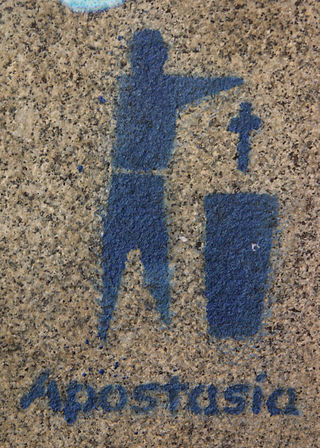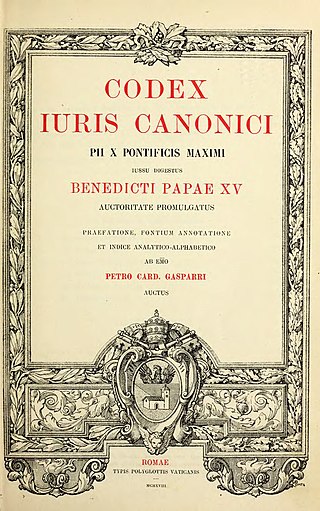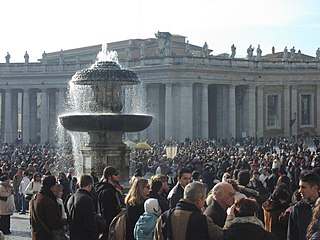
Anointing of the sick, known also by other names such as unction, is a form of religious anointing or "unction" for the benefit of a sick person. It is practiced by many Christian churches and denominations.
In law, motu proprio describes an official act taken without a formal request from another party. Some jurisdictions use the term sua sponte for the same concept.
A lapsed Catholic is a Catholic who is non-practicing. Such a person may still identify as a Catholic, and remains one according to Catholic canon law.
Validity and liceity are concepts in the Catholic Church. Validity designates an action which produces the effects intended; an action which does not produce the effects intended is considered "invalid". Liceity designates an action which has been performed legitimately; an action which has not been performed legitimately is considered "illicit". Some actions can be illicit, but still be valid.
The Code of Canons of the Eastern Churches is the title of the 1990 work which is a codification of the common portions of the canon law for the 23 Eastern Catholic Churches in the Catholic Church. It is divided into 30 titles and has a total of 1546 canons. The code entered into force in 1991.
In persona Christi is a Latin phrase meaning "in the person of Christ", an important concept in Roman Catholicism and, in varying degrees, to other Christian traditions, such as Lutheranism and Anglicanism. In Catholic theology, a priest is In persona Christi because, in the sacraments he administers, it is God and Christ who acts through the instrumentality of the priest. An extended term, In persona Christi capitis, “in the person of Christ the head,” was introduced by the bishops of the Vatican Council II in the Decree on the Ministry and Live of Priests, Presbyterorum Ordinis, December 7, 1965.
In the Catholic Church, a parish is a stable community of the faithful within a particular church, whose pastoral care has been entrusted to a parish priest, under the authority of the diocesan bishop. It is the lowest ecclesiastical subdivision in the Catholic episcopal polity, and the primary constituent unit of a diocese or eparchy. Parishes are extant in both the Latin and Eastern Catholic Churches. In the 1983 Code of Canon Law, parishes are constituted under cc. 515–552, entitled "Parishes, Pastors, and Parochial Vicars."

A formal act of defection from the Catholic Church was an externally provable juridic act of departure from the Catholic Church, which was recognized from 1983 to 2010 in the Code of Canon Law as having certain juridical effects enumerated in canons 1086, 1117, and 1124. The concept of "formal" act of defection was narrower than that of "notorious" defection recognized in the 1917 Code of Canon Law and still narrower than the concept of "de facto" defection. In 2006, the Pontifical Council for Legislative Texts specified in what a formal act of defection from the Catholic Church consisted.

The 1917 Code of Canon Law, also referred to as the Pio-Benedictine Code, is the first official comprehensive codification of Latin canon law.

The 1983 Code of Canon Law, also called the Johanno-Pauline Code, is the "fundamental body of ecclesiastical laws for the Latin Church". It is the second and current comprehensive codification of canonical legislation for the Latin Church of the Catholic Church. It was promulgated on 25 January 1983 by John Paul II and took legal effect on the First Sunday of Advent 1983. It replaced the 1917 Code of Canon Law which had been promulgated by Benedict XV on 27 May 1917.
Sine populo is an expression that is used in the Roman Rite liturgy to describe a Mass celebrated by a priest without a congregation.
The canonical situation of the Society of Saint Pius X (SSPX), a group founded in 1970 by Archbishop Marcel Lefebvre, is unresolved.
In the Roman Catholic Church, the term minister is used with various meanings. Most commonly, the word refers to a person, either lay or ordained, who is commissioned to perform some act on behalf of the Catholic Church. It is not a particular office or rank of clergy, as is the case in some other Christian organisations; rather, minister may be used as a collective term for vocational or professional pastoral leaders including clergy and non-clergy. It is also used in reference to the canonical and liturgical administration of sacraments, as part of some offices, and with reference to the exercise of the lay apostolate.

Catholic laity are the ordinary members of the Catholic Church who are neither clergy nor recipients of Holy Orders or vowed to life in a religious order or congregation. Their mission, according to the Second Vatican Council, is to "sanctify the world".

Episcopal conference of Bulgaria is an ecclesiastical institution, consisting of bishops of the Catholic dioceses in the country. It is bi-ritual because it includes in its composition dioceses in Latin and Byzantine-Slavic rites. Episcopal Conference in Bulgaria is the governing body of the Catholic Church in Bulgaria and performs almost the same features as the Holy Synod in Orthodox churches.
In the canon law of the Catholic Church, a person is a subject of certain legal rights and obligations. Persons may be distinguished between physical and juridic persons. Juridic persons may be distinguished as collegial or non-collegial, and public or private juridical persons. The Holy See and the Catholic Church as such are not juridic persons since juridic persons are created by ecclesiastical law. Rather, they are moral persons by divine law.
The Catholic Church utilizes the oldest continuously functioning legal system in the West, much later than Roman law but predating the evolution of modern European civil law traditions. The history of Latin canon law can be divided into four periods: the jus antiquum, the jus novum, the jus novissimum and the Code of Canon Law. In relation to the Code, history can be divided into the jus vetus and the jus novum. Eastern canon law developed separately.
The jurisprudence of Catholic canon law is the complex of legal theory, traditions, and interpretative principles of Catholic canon law. In the Latin Church, the jurisprudence of canon law was founded by Gratian in the 1140s with his Decretum. In the Eastern Catholic canon law of the Eastern Catholic Churches, Photios holds a place similar to that of Gratian for the West.
The following outline is provided as an overview of and topical guide to the canon law of the Catholic Church:
Spiritus Domini is an apostolic letter in the form of a motu proprio by Pope Francis signed on 10 January 2021 and released the next day. It changed the 1983 Code of Canon Law to allow women to be admitted to the instituted ministries of acolyte and lector (reader), which had until then been exclusively available to men.






